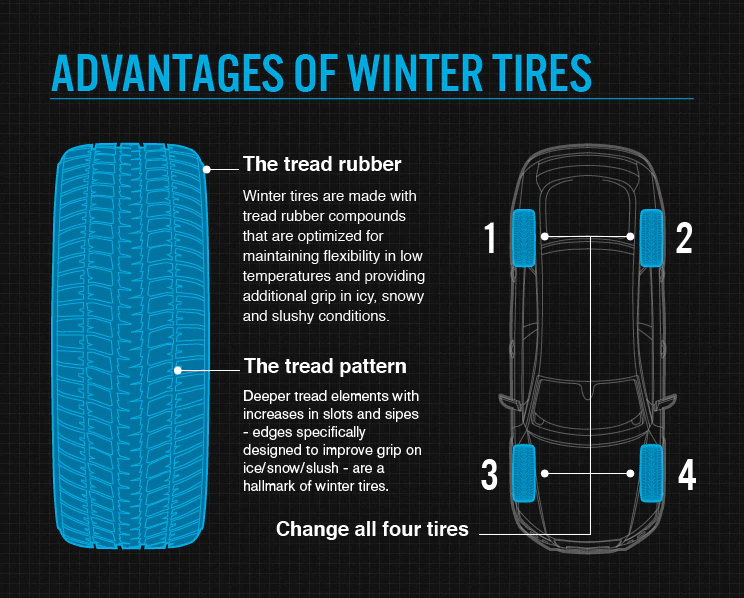Snow winter tires, also called winter tires or snow tires, are specifically designed to provide better traction, handling, and braking performance in cold, snowy, and icy conditions. They are made with a special rubber compound that remains flexible at lower temperatures, allowing for better grip on snow and ice. Additionally, winter tires have deeper treads and more biting edges than all-season or summer tires, which help to channel snow, water, and slush away from the tire for improved control.

Key features of snow winter tires include:
- Rubber compound: Stays soft and flexible in cold temperatures for better grip.
- Tread patterns: More aggressive with deeper grooves to displace snow and water.
- Siping: Small cuts in the tread that provide additional grip on icy surfaces.
If you live in an area with harsh winter weather, snow winter tires can significantly improve safety and driving performance. They are best used when temperatures consistently drop below 45°F (7°C), as they outperform all-season tires in these conditions.

Winter tires offer several key benefits, particularly in cold and snowy conditions:
- Improved Traction: Winter tires are made with a softer rubber compound that stays pliable in cold temperatures, allowing for better grip on icy or snow-covered roads. Their deeper treads and unique patterns help channel snow and slush away from the tire, improving stability and control.
- Enhanced Safety: The better traction of winter tires reduces the likelihood of slipping or losing control in winter conditions, making them particularly important for braking and cornering on icy or snowy roads.
- Shorter Stopping Distance: Due to their specialized tread and rubber, winter tires provide shorter stopping distances in cold and wet conditions compared to all-season or summer tires.
- Better Performance in Low Temperatures: Unlike all-season tires, which harden in cold weather, winter tires are designed to perform well in temperatures below 45°F (7°C), making them effective even when there’s no snow on the ground but the air is cold.
- Increased Durability: In cold climates, winter tires can last longer than using all-season tires in winter conditions, as they are specifically engineered to handle the stresses of snow and ice.
- Enhanced Handling in Snow and Ice: The aggressive tread design of winter tires is optimized to grip icy surfaces and provide better control on slippery roads, reducing the chances of hydroplaning and skidding.

Overall, winter tires help ensure safer driving conditions during the colder months, especially in areas prone to snow, ice, and freezing temperatures.
Contact Doylestown Auto Repair at 267-279-9477 or visit our website at www.doylestownautoshop.com to schedule an appointment to have your car serviced.

